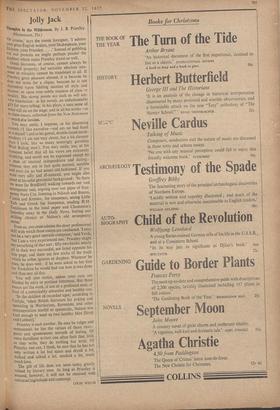Jolly Jack
Thoughts in the Wilderness. By J. 13. Priestley. (Heinemann, 21s.) ;OF course,' says the comic foreigner, 'I admire our great English writers, your Shakespeare, your Dickens, your Priestley. . . .' Instead of gobbling e
ut our protests we might perhaps ponder the qualities which make Priestley travel so well.
Great literature, of course, cannot always be translated properly; but certainly absolute non- s_ense or triviality cannot be translated at all. If Priestley gives pleasure abroad, it is because he does not write for a clique; because he is not dependent upon fiddling niceties of style and manner, or upon over-subtle nuances of class or °ealit.Y. His strong points are such as will stir- 'lye translation : in his novels, an unfashionable gift for story-telling; in his plays, a sure sense of What will do on the stage; and in all his works—as in these essays, collected from the New Statesman --much else besides.
You may smile, I suppose, at his disarming
conceit ('I like narrative—and am no bad hand at it myself') and at his genial, double-faced mock- modesty CI am not very clever, but a bit cleverer _than I look, like so many seemingly gormless yvest Riding men'). You may smile, too, at his innocent belief that all his views are extremely shocking, and could not be expressed except by a Man of unusual independence and daring : whereas they are in fact quite normal, sensible and even (in no bad sense) old-fashioned. If you were very silly and ill-natured, you might also sneer at his solid provincial background : 'So there we were [in Bradford] walking towards our vast sevenpenny teas, arguing over our pipes of four- Penny Navy Cut, listening to Nikisch and Busoni, `- asals and Kreisler, for ninepence, seeing Little .,,
Tomlinson and Grock for fourpence, reading H.M.
in the local paper and Chesterton's Saturday essay in the Daily News, buying our shilling classics or' Nelson's old sevenpenny series: Even so, you must admire the sheer professional skill With which these essays are conducted. 'I may not be a very good operatic composer,' said Verdi, but I am a very experienced one.' Priestley might say something of that sort : fifty-two books, nearly all in their way successful, are listed opposite his title page, and there are few tricks of the trade which he either ignores or despises. Whatever he does, he does well : if he were asked to bat first for Yorkihire he would find out how it was done and then stay all day.
You will also notice, unless your eyes are blinded by envy or partisan bitterness, that these essays are work, if not of a profound man, at least of a remarkably attractive and healthy one.
'In the sickliest of recorded ages,' according to Carlyle, 'when British literature lay puking and sprawling in Wertherism, Byronism, and other sentimentalism tearful or spasmodic, Nature was kind enough to send us two healthy Men [Scott and Cobbett].'
Priestley is such another. He may be vulgar and
sentimental; he has the virtues of those vices: gusto and spontaneous warmth of feeling. Of more fastidious writers one often feels that, little as they write, they do nothing but write. Of Priestley one can, I think, be sure that he has not Only written a lot but eaten and drunk a lot, walked and talked a lot, smoked a lot, made much love.
The gift of life does not seem today greatly valued by literary men. As long as Priestley is around, however, it will not be received with Universal ingratitude and contempt.
COLIN WELCH










































































 Previous page
Previous page